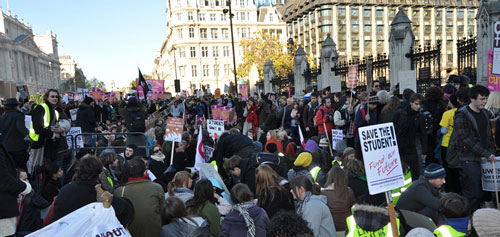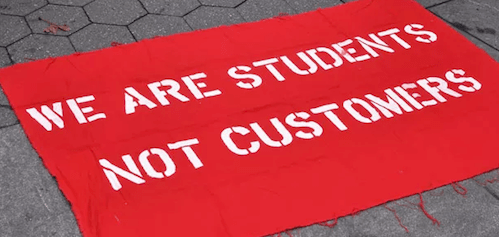TEF: What is the Teaching Excellence Framework?
The TEF is coming to unis across England. But is it something students should be feeling positive about, or doing everything in their power to stop?

The Teaching Excellence Framework is due to be implemented from next year onwards, and it could see your tuition fees rising to £9,250 in 2017, £9,500 in 2018, then who knows after that!
The proposed changes will massively affect current students as well as prospective ones, so it's crucial you understand what's on the horizon – and know what can be done.
The TEF is still making it's way through parliament, so now's the time to speak up and be heard!
What’s on this page?
First thing’s first – WTF is the TEF?
 Credit: TheJuniorPartner – Flickr
Credit: TheJuniorPartner – Flickr
The Teaching Excellence Framework (TEF) was announced as part of the Higher Education and Research Bill, as the government’s new rating system that they plan to introduce in order to assess universities and their quality of teaching.
The government reckons the TEF will ensure that teaching standards at universities in England are up to scratch, and plan to use it as a way of assessing whether a uni needs to up their game. They claim the TEF will help provide a better experience to fee-paying students… but there’s a darker side to their proposals, too.
There’s no hiding the fact that the TEF is heavily bound with cash incentives which, as always, tends to complicate things. It turns out that as a reward, any uni that fares well in the TEF will be allowed to increase yearly tuition fees well above the previously agreed £9,000 fee cap, which the government have confirmed they're scrapping.
Whilst the TEF won’t be used to dictate fees officially until 2019, it’s been confirmed that the next two years will see all unis in England raising fees across the board in line with inflation in what they’re calling two “trial years”, apparently to ‘phase in’ the system...riiight.
Therefore, it’s really important that even current students understand the implications of the TEF now, as it’s likely they’ll be affected too.
The TEF could be about to completely transform Higher Education in England as we currently know it – and for the worst.
Arm yourself with the facts, and find out how you can fight against it!
STS on TEF
 Here at Save the Student, we’re extremely sceptical of the TEF, and we’re concerned about what the new system could mean for the future of higher education in the UK.
Here at Save the Student, we’re extremely sceptical of the TEF, and we’re concerned about what the new system could mean for the future of higher education in the UK.
There’s no doubt that the TEF will result in tuition fee rises across the country, but as the £9k per year cap is lifted, there’s a concern of just how far unis will go once the floodgates are open.
As it stands, unis that score well in the TEF will be able to increase fees yearly in line with inflation, which could see some charging £10,000 within the next four years. Some have predicted higher, but linking fees with inflation at a time where the markets are so unreliable post-Brexit (and now Trump!) is a massive risk.
If inflation gets in the way of ‘deserved’ unis getting their hard-earned yearly fee increases, what’s to stop the government from giving them the go-ahead to raise fees anyway – and where does that take us?
There’s also the nightmare of our Higher Education system being completely marketised to think about: The TEF will encourage universities to compete with one another to get the best results, so they can increase fees. This not only means that lower performing universities will simply be left behind, when they’re the institutions likely to need the most support, but the 'best' unis will become so expensive that they'll only be accessible to the wealthy.
What's also extremely concerning is that regulating the new system will be a very powerful newly-established 'Office for Students' which, ironically, has no student representatives on the board.
The Office for Students will completely control the fee system, and could even have the power to close a university down if it believes it's underperforming, without having to go through parliament first.
How will universities be assessed?
 Some of the UK’s best universities are predicted to score badly in the TEF.
Some of the UK’s best universities are predicted to score badly in the TEF.
Weird, we know, but this is basically due to the fact that the criteria used to assess them doesn’t necessarily build an accurate picture of the quality of the institution, but rests on other external factors that universities aren’t always able to control.
For example, some universities focus more on research than teaching, and the criteria doesn't respect this. As Valerie Amos, Director of SOAS has said, the TEF looks set to be “rather a blunt instrument” that won’t respect the diversity of Higher Education.
Here’s the criteria unis will be judged on…
- The numbers of uni leavers who land graduate-level jobs (and what their salaries are)
- The number of students who drop out before graduating
- How students rate their institutions in the annual National Student Survey (NSS).
With the information gathered from the above, the government will then divide universities into league tables. They’ll be put into three ‘ranks’ and graded either gold, silver and bronze, which roughly translates to:
- Gold: Those universities that show outstanding levels of stretch that ensures all students are significantly challenged to achieve their full potential.
- Silver: Unis that show high levels of stretch that ensures all students are significantly challenged.
- Bronze: Unis where provision is of satisfactory quality, but are likely to be significantly below benchmark in one or more areas.
As we touched on earlier, what’s particularly shocking is that the government are allowing universities across the board to raise fees in line with inflation for the first two years, regardless of how they score.
From AY 2017/18, all universities in England will be permitted to raise fees to £9,250 and then again to £9,500 in AY 2018/19 in what they’re calling two “trial years” before they officially begin using the grading system to decide which unis can raise fees, and which ones can’t.
A spokesperson for the government told the BBC that:
The teaching excellence framework will allow universities to maintain fees in line with inflation only if they meet a quality bar, as set out in the recent Higher Education White Paper.
Looks like the quality bar must be set pretty low for the two proposed trial years, as currently no university has failed to meet expectations required to raise fees.
The problem with TEF
Unfortunately, as you might’ve gathered from the above, there are a lot of potential problems on the horizon for the UK’s Higher Education system should the TEF go forward in it’s current form.
Here are just a few of them, in a nutshell:
The criteria doesn’t reflect teaching quality
 The criteria being used to assess universities is extremely crude for a start, and tells us very little about university teaching quality. It also offers no solutions as to how things can be improved – how will punishing under performing universities by limiting their income improve teaching?
The criteria being used to assess universities is extremely crude for a start, and tells us very little about university teaching quality. It also offers no solutions as to how things can be improved – how will punishing under performing universities by limiting their income improve teaching?
Judging teaching quality on graduate employment rates isn’t fair, as we all know there are many other factors that contribute to employment levels, such as the number of opportunities in a given area, a student’s social class and the subject they chose to study. Not that this is a good thing, of course!
The National Student Survey is also totally unfit to offer an accurate picture of how a university is performing. The future of England’s universities relies on just 23 heavily over-simplified multiple choice questions – many of which, if we’re being realistic, could be answered according to whether you’ve had a good day or not.
If, for instance, a student is unhappy that they’re finding a course particularly challenging, not getting the grades they were gunning for or simply not enjoying a particular module, they may be inclined to score the uni lower than is deserved.
Somewhat ironically, grabbing a gold or silver grading in the TEF system relies on a uni making sure students are “significantly challenged” – isn’t it fair to say that not all students will necessarily see this as a good thing?
As the NUS’s vice-president for higher education, Sorana Vieru, accurately puts it:
Quality teaching is supposed to challenge a learner and take them out of their comfort zone – education can change one’s view of the world – and this does not equate with being satisfied with the experience of a course.
Marketisation of Higher Education
 Many argue that removing the £9,000 per year tuition fee cap and encouraging universities to compete against each other will result in a total marketisation of Higher Education – similar to what they currently have in the US.
Many argue that removing the £9,000 per year tuition fee cap and encouraging universities to compete against each other will result in a total marketisation of Higher Education – similar to what they currently have in the US.
In addition to the TEF, the government say in the Higher Education and Research Bill (which the TEF is part of) that they want to make it easier for private universities to have degree-awarding powers (again, similar to how things are in the US). The belief is that more competition in the HE sector will drive quality up, but as a result fees are also likely to go through the roof.
The problem is that under this kind of system, the ‘best’ universities will be the most expensive ones, which will put students from lower income families off applying. Creating a system where wealthy students go to top unis, whereas less well-off students opt for cheaper universities with lower teaching quality will only feed a system that hampers social mobility.
Using TEF to limit international students
 There’s a lot of anxiety surrounding the implications the TEF could have on the number of international students coming to study in the UK. Home Secretary Amber Rudd has announced a planned crackdown on foreign students after Brexit, proposing that tighter visa restrictions will be imposed on “lower quality” universities.
There’s a lot of anxiety surrounding the implications the TEF could have on the number of international students coming to study in the UK. Home Secretary Amber Rudd has announced a planned crackdown on foreign students after Brexit, proposing that tighter visa restrictions will be imposed on “lower quality” universities.
Many believe that the TEF’s ranking system will be used, suggesting those universities who have been graded bronze will be limited on how many internationals they can recruit. This again feeds into the marketisation of the whole system, as many universities rely on the higher fees paid by international students in order to survive, and denying them international fee-paying students could ultimately lead to closure.
Not only this, but limiting overseas students will make universities less diverse, affect the quality of research produced, and just generally make them pretty boring!
Edward Byrne, president and principal of King’s College London, has said:
There’s no rationale for linking it [the TEF] to the regulation of international student recruitment as it was not designed for this purpose. It would damage the UK’s attractiveness as a study destination in what is a very competitive global market place.
London School of Economics, one of the UK’s most prestigious schools, was the lowest ranking of all the major universities in the National Student Survey last year, but 70% of their students are from overseas. Therefore, any restrictions on how many international students they can recruit could be catastrophic.
What can be done?
 Credit: Gary Knight –Flickr
Credit: Gary Knight –Flickr
The current situation is that the House of Commons is due to receive a report on the Higher Education Bill following the debate, but there's no indication yet of when this will happen. Until then, technically nothing is 100% set in stone.
It’s worth knowing the TEF also isn’t compulsory, but with £750 per student head up for grabs over the two year trial period, it’s very unlikely that many (if any) unis in England won’t sign up to the scheme.
The deadline for application is 26th January 2017, and many unions are already putting pressure on universities not to sign up.
Various student unions are choosing to boycott the NSS, as this is the only way they can make any direct impact – refusing to take part in the survey means the TEF can’t move forward.
If you’re as unsettled about the TEF as we are, it’s time to speak out!
Get in touch with your union and see what plans they have in place. Students across the country have already started running campaigns, such as Sussex University’s TEF OFF campaign and the University of Manchester’s TEFinitely not campaign – looks like it’s also turning into a competition for the best puns, too!
Don’t forget there will be a national demo taking place in London on 19th November to fight against the TEF (more info here). We’ll see you there.








